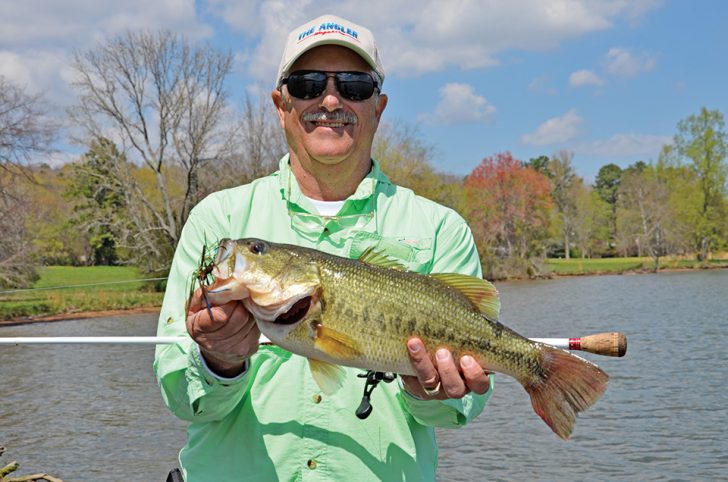By CAM Staff
I’s the time of year when big-water bass anglers bundle up in their bibs and parkas and slug it out through bitter reservoir winds to drag jigs on the bottom. For some of us, finding joy in such misery seems masochistic.
Why brave the cold winds of big water when countless sheltered ponds and small lakes are there to provide winter bass fisheries that’ll scratch the itch? Small waters often fish very well this time of year. Whether casting from the bank or a jonboat, here are a few tips to take with you.
- Find Warmer Water: Carry a thermometer. Water temps just a couple degrees warmer than surrounding water will consolidate baitfish and bass. In spring-fed lakes or ponds, an underground spring will provide relatively stable temperatures year-round. During winter, flows from a spring are likely warmer than the main body. Where there are no springs, look to sun-warmed rock or metal structure. Muddy shallows are also known to warm more quickly in the sun.
- Play the Weather: The smaller the volume of water, the more easily influenced it is by weather patterns. On a small lake, water temperatures can increase dramatically with a single day of warmer-than-normal weather. The bite can go from non-existent to wide-open in an afternoon. String together a three-day warming trend, and your pond might exhibit spring-like feeding patterns.
- Find the Fish: On small waters there are limited areas where bass can go to find comfort. Rather than spreading out in search of forage, bass group up in areas where they are comfortable. If you don’t find fish on sun-warmed rip-rap, look to the steep drop-offs at pond dams or creek channels. They might be down there stacked up in 10 feet of water.
- Match the Hatch: Bass are not as aggressive when they are cold, which means you have to go with a more natural approach. Bugs and frogs aren’t on the menu this time of year, so baitfish imitations like jerkbaits and crankbaits are your best bet. Reel them down to depth and fish with slow twitches. If crawfish are active year-round where you fish, a jig is absolutely a good option.
- Cover Water: Covering water is relative. This time of year, you’ll want to slow it down. Yet you still need to encounter fish to catch them. One of the great things about small waters is you can fish a lot, or all, of a small lake or pond in a single afternoon. Fan cast and work your baits slowly enough to be effective, but keep moving until you find that area where fish are piled up.
